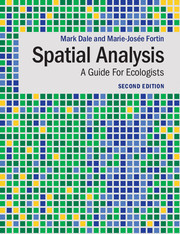Description
Spatial Analysis (2nd Ed., Revised edition)
A Guide For Ecologists
Authors: Dale Mark R. T., Fortin Marie-Josée
An essential guide for graduates, researchers and professionals to spatial analysis and the fast-growing range of methods available.
Language: English
Subject for Spatial Analysis:
Approximative price 69.90 €
In Print (Delivery period: 14 days).
Add to cart
Publication date: 09-2014
454 p. · 18.9x24.6 cm · Paperback
454 p. · 18.9x24.6 cm · Paperback
Description
/li>Contents
/li>Biography
/li>
Nowadays, ecologists worldwide recognize the use of spatial analysis as essential. However, because of the fast-growing range of methods available, even an expert might occasionally find it challenging to choose the most appropriate one. Providing the ecological and statistical foundations needed to make the right decision, this second edition builds and expands upon the previous one by: ? Encompassing the basic methods for spatial analysis, for both complete census and sample data ? Investigating updated treatments of spatial autocorrelation and spatio-temporal analysis ? Introducing detailed explanations of currently developing approaches, including spatial and spatio-temporal graph theory, scan statistics, fibre process analysis, and Hierarchical Bayesian analysis ? Offering practical advice for specific circumstances, such as how to analyze forest Permanent Sample Plot data and how to proceed with transect data when portions of the data series are missing. Written for graduates, researchers and professionals, this book will be a valuable source of reference for years to come.
Preface; 1. Spatial concepts and notions; 2. Ecological and spatial processes; 3. Points, lines and graphs; 4. Spatial analysis of complete point location data; 5. Contiguous units analysis; 6. Spatial analysis of sample data; 7. Spatial relationship and multiscale analysis; 8. Spatial autocorrelation and inferential tests; 9. Spatial partitioning: spatial clusters and boundary detection; 10. Spatial diversity analysis; 11. Spatio-temporal analysis; 12. Closing comments and future directions; References; Index.
Mark R. T. Dale is the Provost of the University of Northern British Columbia, and Professor in the Ecosystem Science and Management Program. His research concerns the effects of interactions between plants on the spatial relationships of plants of different species in a community and the effects of population processes on the development of spatial pattern in the vegetation, as during succession. One main focus of research in the past twenty years has been the analysis of spatial structure in plant communities.
Marie-Josée Fortin is Professor of Spatial Ecology in the Department of Ecology and Evolutionary Biology, University of Toronto. Her research focuses on the application of spatial ecology to fields of research such as the conservation biology, ecotone detection, disturbance ecology, organismal dispersal, landscape genetics, and functional connectivity of landscapes. She has been awarded the 2013 Distinguished Landscape Ecologist Award by the United States Chapter of the International Association for Landscape Ecology (US-IALE).
Marie-Josée Fortin is Professor of Spatial Ecology in the Department of Ecology and Evolutionary Biology, University of Toronto. Her research focuses on the application of spatial ecology to fields of research such as the conservation biology, ecotone detection, disturbance ecology, organismal dispersal, landscape genetics, and functional connectivity of landscapes. She has been awarded the 2013 Distinguished Landscape Ecologist Award by the United States Chapter of the International Association for Landscape Ecology (US-IALE).
© 2024 LAVOISIER S.A.S.

